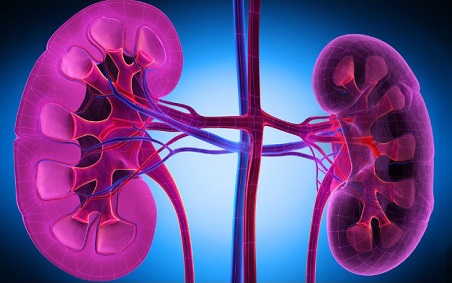Nikhil Prasad Fact checked by:Thailand Medical News Team Jun 08, 2024 1 year, 4 months, 6 days, 8 hours, 21 minutes ago
Nephrology Updates: Chronic kidney disease (CKD) dramatically increases the risk of cardiovascular disease (CVD). This risk escalates as kidney function deteriorates. Among the factors contributing to CVD in CKD patients, vascular calcification (VC) is gaining recognition for its critical role in reducing patient survival. VC is the result of misplaced calcium in the arteries, which is common in CKD and leads to severe cardiovascular complications.
 Vitamin K: A Potential Lifesaver for Kidney Patients
The Role of Vitamin K
Vitamin K: A Potential Lifesaver for Kidney Patients
The Role of Vitamin K
Vitamin K is well-known for its role in blood clotting and bone health. However, it also plays a crucial part in regulating VC through vitamin K-dependent proteins (VKDPs). The matrix Gla protein (MGP) is a significant VKDP that inhibits VC and serves as a biomarker for vitamin K levels. CKD patients often suffer from vitamin K deficiency due to dietary restrictions, medications, and impaired absorption.
Why CKD Patients Lack Vitamin K
CKD patients, especially those in advanced stages, frequently have a deficiency in vitamin K. This deficiency arises from dietary restrictions, medications, and impaired absorption due to the uremic environment of CKD. Studies show a strong link between low vitamin K levels, inactive MGP, and increased CVD risk in CKD patients.
The Impact of Vitamin K Deficiency
Vitamin K deficiency in CKD patients leads to severe cardiovascular complications. VC occurs early in CKD and worsens as the disease progresses. Types of VC in CKD patients include arterial and heart valve calcification and calciphylaxis. These conditions significantly increase the risk of cardiovascular morbidity and mortality. Studies reveal that CKD patients are 45 times more likely to have arterial wall microcalcification compared to the general population.
How Vitamin K Works
Vitamin K activates MGP, which helps prevent or delay VC. MGP works by scavenging free calcium ions from the arterial walls and downregulating the promoter of VC, bone morphogenetic protein-2 (BMP-2). This process requires sufficient vitamin K for MGP to function correctly. In CKD patients, vitamin K deficiency leads to inactive MGP, which accumulates at sites of calcification and is associated with arterial stiffness and increased mortality.
Biomarkers of Vitamin K
Measuring vitamin K levels directly in the blood has limitations, making VKDPs a more reliable indicator. The inactive forms of VKDPs, such as dp-ucMGP and PIVKA-II, provide insights into vitamin K status. Elevated levels of dp-ucMGP are associated with VC and increased CVD risk in CKD patients. Similarly, PIVKA-II levels reflect vitamin K deficiency and correlate with cardiovascular complications.
Clinical Trials and Studies
Several clinical trials that were covered in previous
Nephrology Updates, have investigated the potential benefits of vitamin K supplementation in CKD patients. Despite
promising pre-clinical data, results from clinical trials have been inconsistent. Some studies showed that vitamin K supplementation could reduce the progression of VC, while others did not find significant benefits.
Key Studies and Findings
-Kurnatowska et al. (2015): This study involved 42 non-dialysis CKD patients who received either vitamin K2 (MK-7) and vitamin D or vitamin D alone for 270 days. The group receiving MK-7 showed a significant reduction in carotid intima-media thickness (CIMT), indicating potential benefits in preventing VC.
https://karger.com/kbr/article/41/3/231/182582/Plasma-Desphospho-Uncarboxylated-Matrix-Gla
-K4Kidneys (2020): This trial included 159 CKD patients who received either 400 µg of MK-7 or a placebo for 12 months. No significant differences were observed in vascular stiffness or calcification, possibly due to the short follow-up period and low vitamin K deficiency in the study population.
https://journals.lww.com/jasn/fulltext/2020/10000/vitamin_k_supplementation_to_improve_vascular.22.aspx
-Dialysis Patients: Various studies on dialysis patients have explored the effects of vitamin K supplementation. While some studies showed reductions in arterial stiffness and VC, others found no significant impact. The variations in results could be due to differences in dosages, follow-up durations, and patient populations.
The Future of Vitamin K Supplementation
Despite mixed results, the potential of vitamin K to improve cardiovascular outcomes in CKD patients remains promising. Future studies should focus on optimizing dosages, extending follow-up periods, and including larger, more diverse populations to better understand the benefits of vitamin K supplementation.
Recommendations for Future Research
-Optimize Dosages: Future trials should explore higher dosages of vitamin K to ensure adequate supplementation and activation of MGP.
-Extended Follow-up: Longer follow-up periods are necessary to observe the long-term effects of vitamin K on VC and cardiovascular outcomes.
-Diverse Populations: Including a broader range of patients will help generalize the findings and understand the effects of vitamin K across different demographics.
Conclusion
Vitamin K holds promise as a crucial nutrient in managing cardiovascular complications in CKD patients. While current studies show mixed results, ongoing research and optimized clinical trials could reveal the full potential of vitamin K in improving the health and survival of CKD patients. As we continue to explore this vital nutrient, vitamin K supplementation may become a standard part of managing CKD and preventing cardiovascular disease.
The study review by researchers from the Medical School, Aristotle University of Thessaloniki-Greece, University of Ioannina-Greece and RWTH Aachen University-Germany were published in the peer reviewed journal: Nutrients.
https://www.mdpi.com/2072-6643/16/12/1798
For the latest
Nephrology Updates, keep on logging to Thailand Medical News.
Read Also:
https://www.thailandmedical.news/news/mobility-limitation-and-disability-in-the-aged-caused-by-low-vitamin-k-levels
https://www.thailandmedical.news/news/the-many-health-benefits-of-vitamin-k-supplements
https://www.thailandmedical.news/news/new-research-show-that-vitamin-k-reduces-risk-of-developing-type-ii-diabetes-by-51%-and-inhibits-metabolic-syndrome
https://www.thailandmedical.news/news/vitamin-k-new-study-shows-that-vitamin-k-may-offer-protective-health-benefits-in-the-elderly-especially-in-terms-of-vascular-health
https://www.thailandmedical.news/news/researchers-in-netherlands-discover-that-lack-of-sufficient-vitamin-k-plays-a-role-in-covid-19-in-terms-of-lung-damage-and-thromboembolism
https://www.thailandmedical.news/news/covid-19-supplements-exploring-the-potential-role-of-vitamin-k-in-suppressing-sars-cov-2-induced-ferroptosis
https://www.thailandmedical.news/news/protective-role-of-vitamin-k3-supplements-on-sars-cov-2-structural-protein-induced-inflammation-and-cell-death-a-potential-treatment-for-covid-19
